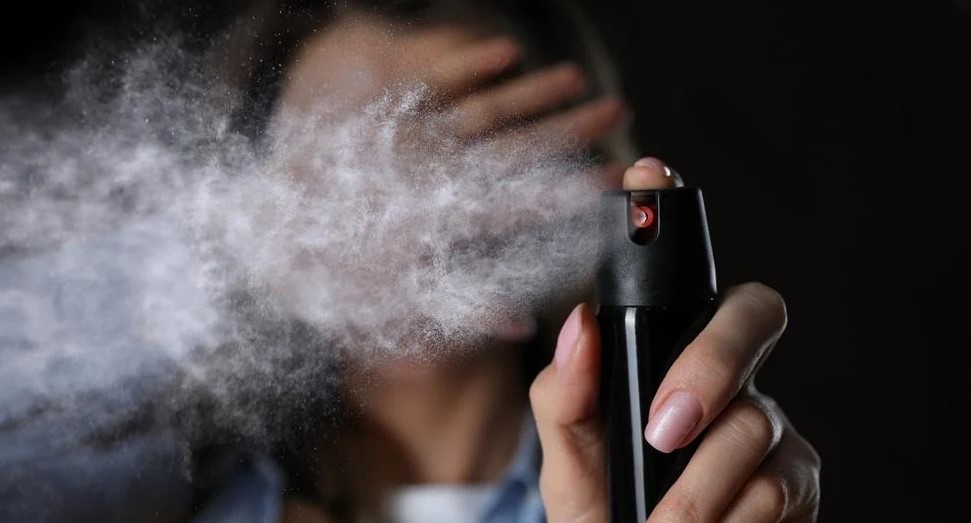Pepper spray is a popular self-defense tool that many individuals use to protect themselves in dangerous situations. In Massachusetts, the legality of carrying and using pepper spray is subject to specific regulations. While it is generally legal for personal defense, there are important rules and restrictions that residents must follow to ensure they are complying with state law. Follow self-defensetools.com!
Pepper Spray Regulations in Massachusetts
In Massachusetts, pepper spray (also known as OC spray or oleoresin capsicum spray) is legal to possess and use for self-defense purposes, but there are several conditions that individuals must meet to stay within the boundaries of the law.
1. Age Requirement
To legally purchase and possess pepper spray in Massachusetts, individuals must be at least 18 years old. The law prohibits minors from possessing or using pepper spray for self-defense.
2. Approved Formulations
Pepper spray sold in Massachusetts must be formulated with specific concentrations of oleoresin capsicum (OC), the active ingredient in pepper spray. The concentration and formula of the pepper spray must not exceed a certain level to be considered legal for civilian use.
Typically, pepper spray products that contain a concentration of less than 18% OC are legal to carry and use in Massachusetts. Be sure to check the packaging of any pepper spray you purchase to confirm that it meets state guidelines.
3. Restrictions on Carrying and Usage
While it is legal to possess pepper spray for self-defense purposes, the law in Massachusetts prohibits the carrying or use of pepper spray in certain places. You should be aware of the following restrictions:
- Schools and Educational Institutions: Pepper spray is prohibited in school zones, on school property, or at educational events, unless you have express permission from the institution or authority. Carrying pepper spray in these areas could lead to criminal charges.
- Government Buildings: Similar to other locations, pepper spray is typically prohibited in government buildings, courthouses, and other state-run institutions.
- Airports and Federal Property: It is also illegal to carry pepper spray in airport security zones, as well as in areas regulated by federal law. This includes certain federal buildings or areas under federal jurisdiction.
- Public Transportation: Pepper spray should not be used aggressively or in any manner that could disturb public order, including on public transportation.
4. Intent for Self-Defense
Massachusetts law allows for the possession and use of pepper spray for legitimate self-defense. However, it is illegal to carry pepper spray for any unlawful or offensive purpose. Using pepper spray to initiate an altercation or as a form of aggression can lead to criminal charges.
In general, the use of pepper spray must be done in situations where a person is in imminent danger, and the use of force is necessary to protect oneself from harm. If an individual uses pepper spray outside of a self-defense context (such as using it in a fight or assault), they may be charged with assault or other criminal offenses.

5. Restrictions on Sales
In Massachusetts, the sale of pepper spray is subject to certain rules. Retailers who sell pepper spray must ensure that their products comply with state laws, including packaging that reflects the proper concentration and product information. Additionally, sellers must confirm that buyers meet the age requirements (at least 18 years old) and understand that pepper spray is intended for self-defense.
Additional Considerations for Pepper Spray Users in Massachusetts
While it is legal to carry and use pepper spray for self-defense in Massachusetts, there are a few practical considerations to keep in mind:
1. Training and Knowledge
Though no formal training is required to purchase or carry pepper spray in Massachusetts, it is highly advisable for users to familiarize themselves with how the spray works, how to deploy it properly, and the best techniques for using it effectively. Practicing in safe environments can increase confidence and effectiveness during a real emergency.
2. Proper Storage
Pepper spray should be stored in a cool, dry place, away from children or unauthorized users. It is also important to ensure that the spray canister is in good working condition and has not expired. Expired or damaged pepper spray may fail to work effectively in an emergency.
3. Legal Implications of Misuse
If pepper spray is used in a way that is not in self-defense, such as spraying someone in a non-threatening situation or during an argument, it could result in legal consequences. Misuse of pepper spray could lead to criminal charges, including assault or harassment.
4. Carrying Pepper Spray in Your Vehicle
In Massachusetts, it is generally acceptable to carry pepper spray in your vehicle as long as it is not used in a manner that violates state laws. However, if you are driving near schools, government buildings, or other restricted areas, be mindful of where and when you may legally carry it in your vehicle.
Conclusion
In Massachusetts, pepper spray is legal to possess and use for self-defense, but it is subject to various regulations. You must be at least 18 years old, ensure that the pepper spray is appropriately formulated, and follow restrictions on where and how it can be carried and used. Always keep in mind that it is illegal to carry pepper spray for any unlawful purpose, and misuse of the spray can result in legal consequences.
To summarize:
- Legal: Pepper spray is legal for self-defense if it meets state guidelines, including age restrictions and product formulation.
- Illegal: Using pepper spray for offensive purposes, carrying it in restricted areas (such as schools, government buildings, and airports), or possessing it as a minor is illegal.
As with any self-defense tool, it is important to understand the laws and use pepper spray responsibly. Be aware of your surroundings and always act within the boundaries of the law to protect yourself and others.
Related Posts: What Self-Defense Weapons Are Legal in Texas?









